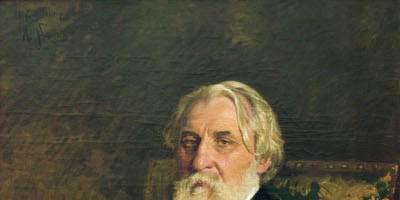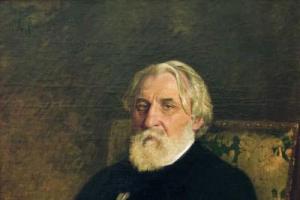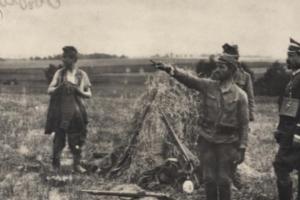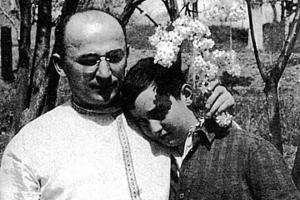It was based on the features inherent in the writer’s biography. The characterization of Asya in the story “Asya” is impossible without a brief excursion into the life, or rather the love of Ivan Sergeevich.
Eternal friend of Pauline Viardot
The relationship between Polina Viardot and Ivan Sergeevich lasted 40 long years. It was a love story that settled in the heart of only one person, Turgenev, and the woman he passionately revered did not reciprocate his feelings. She was married. And for all four decades, Ivan Sergeevich came to their house as an eternal and forever faithful friend of the family. Having settled “on the edge of someone else’s nest,” the writer tried to build his own, but until the end of his life he loved Pauline Viardot. Viardot became a homewrecker, a killer of the happiness of girls who recklessly fell in love with Ivan Sergeevich.

It is worth saying that the tragic relationship with Viardot was not new to him. The very young Ivan, at the age of eighteen, fell in love with his daughter Katenka. The sweet angelic creature that the girl seemed to be at first glance, in fact, did not turn out to be such. She had a long relationship with the main village ladies' man. By evil irony, the girl’s heart was conquered by Sergei Nikolaevich Turgenev, the writer’s father.
However, not only did the writer have his heart broken, he himself more than once rejected the women who loved him. After all, until the end of his days he adored Pauline Viardot.
Characteristics of Asya in the story “Asya”. Type of Turgenev girl
Many people know that Turgenev’s girls exist, but few remember what she is like, the heroine from the writer’s stories.

The portrait characteristics of Asya found on the pages of the story are as follows.

As can be seen from the above lines, Asya had atypical beauty: her boyish appearance combined short large eyes fringed with long eyelashes and an unusually slender figure.
A brief description of Asya and her external image will be incomplete without mentioning that, most likely, it reflected Turgenev’s disappointment in the circle (consequences towards Ekaterina Shakhovskaya).
It is here, on the pages of the story “Asya”, that not only Turgenev’s girl, but Turgenev’s feeling of love is born. Love is compared to revolution.

Love, like revolution, tests heroes and their feelings for perseverance and vitality.
Asya's origin and character
The backstory of the heroine's life made a significant contribution to the girl's character. She is the illegitimate daughter of a landowner and a maid. Her mother tried to raise her strictly. However, after Tatyana’s death, Asya was taken in by her father. Because of him, feelings such as pride and distrust arose in the girl’s soul.
The characterization of Asya from Turgenev's story introduces initial inconsistencies into her image. She is contradictory and playful in her relationships with all people. If you take her interest in everything around her, you can understand that the girl shows this a little unnaturally. Since she looks at everything with curiosity, but in fact does not delve into anything carefully or peer into it.
Despite her inherent pride, she has a strange predilection: making acquaintances with people who are lower in class than her.
Moment of Spiritual Awakening
The characterization of Asya from Turgenev’s story will be incomplete if we do not think about the issue of the spiritual awakening of the main characters: Asya and Mr. N.N.

The hero and author of the story, having met Asya in a small German town, feels that his soul trembled. We can say that he came to life spiritually and opened up to his feelings. Asya removes the pink veil through which he looked at himself and his life. N.N. understands how false his existence was until the moment he met Asya: time wasted on travel now seems to him an unaffordable luxury.

The reborn worldview of Mr. N.N. looks forward to every meeting with trepidation. However, faced with a choice: love and responsibility or loneliness, he comes to the conclusion that it is absurd to marry someone whose temper he can never conquer.

Love also helps Asya’s character reveal itself. She begins to realize herself as an individual. Now she cannot get by with the usual reading of books from which she gained knowledge about “true” love. Asya opens up to feelings and hopes. For the first time in her life, she stopped doubting and opened herself up to vivid feelings.
What is she like, Asya, in the eyes of Mr. N.N.?
The characterization of Asya in the story “Asya” is not carried out by Ivan Sergeevich himself; he assigns this task to his hero, Mr. N.N.
Thanks to this, we can notice the transformation of the hero’s attitude towards his beloved: from hostility to love and misunderstanding.
Mr. N.N. noted Asya’s spiritual impulse, wanting to show her “high” origin:

At first, all her actions seem like “childish antics” to him. But soon he saw her in the guise of a frightened but beautiful bird:

The relationship between Asya and Mr. N.N.
The verbal characterization of Asya in the story “Asya” predicts the tragic outcome of the emerging relationship between the heroine and Mr. N.N.
By nature, Asya is a contradictory person from her very roots. One has only to remember the girl’s attitude towards her mother and her origins:

The girl loved to be paid attention to, and at the same time was afraid of it, since she was quite timid and bashful.
Asya dreams of a hero who will become for her the embodiment of happiness, love and thought. A hero who can meekly oppose himself to “human vulgarity” in order to save love.
Asya saw her hero in Mr. N.N.
The girl fell in love with the narrator from the first moment they met. She wanted to intrigue him and at the same time show that she was a well-born young lady, and not some kind of daughter of Tatyana’s maid. This behavior, unusual for her, influenced the first impression formed by Mr. N.N.
Then she falls in love with N.N. and begins to expect from him not just actions, but an answer. The answer to the question that worries her: “What to do?” The heroine dreams of a heroic deed, but never receives it from her lover.
But why? The answer is simple: Mr. N.N. not endowed with the spiritual wealth inherent in Asa. His image is quite meager and a little sad, although not without a touch of edification. This is how he appears to us according to Chernyshevsky. Turgenev himself sees him as a man with a trembling, tormented soul.
“Asya”, characterization of N.N.
Soul impulses, thoughts about the meaning of life were unfamiliar to the hero of the story N.N., on whose behalf the story is told. He led a dissolute life in which he did what he wanted and thought only about his own desires, neglecting the opinions of others.

He did not care about a sense of morality, duty, responsibility. He never thought about the consequences of his actions, while shifting the most important decisions onto the shoulders of others.
However, N.N. - not the complete embodiment of the bad hero of the story. Despite everything, he did not lose the ability to understand and separate good from evil. He is quite curious and inquisitive. The purpose of his journey is not the desire to explore the world, but the dream of getting to know many new people and faces. N.N. He is quite proud, but he is not alien to the feeling of rejected love: he was previously in love with a widow who rejected him. Despite this, he remains a kind and quite pleasant young man of 25 years old.

Mr. N.N. realizes that Asya is a girl with oddities, so she is afraid in the future to encounter unexpected turns in her character. In addition, he sees marriage as an unbearable burden, the basis of which is responsibility for someone else’s fate and life.
Afraid of change and a changeable but full life, N.N. refuses possible mutual happiness, placing on Asya's shoulders the responsibility for deciding the outcome of their relationship. Having thus committed betrayal, he predicts in advance a lonely existence for himself. Having betrayed Asya, he rejected life, love, and the future. However, Ivan Sergeevich is in no hurry to reproach him. Since he himself paid for the mistake he made...
Left a reply Guest
Asya is the main character. The illegitimate daughter of a landowner and his serf maid. After the death of her mother and father, her paternal brother, Gagin, takes care of her upbringing. Until the age of seventeen, A. was brought up in one of the best St. Petersburg boarding schools. Then Gagin, having retired, goes to travel around Europe and takes A. with him. In a small German town, the heroine meets a young Russian (N.N.) and falls in love with him. The story of their love reveals a sharp unusualness in the psychology and actions of A. A misunderstanding, which in the life of another person would have been successfully resolved within a few days (or even hours), leads to the girl’s flight and disappearance without a trace. The character of the heroine is woven from contradictions and extremes. Her sincerity and directness immediately confuse N.N. Her dreams of love merge with the ideal of sacrificial heroism, with the thought of prayer, of difficult feats, and, in the end, with longing for something beyond.
These features of the “great soul” bring A. closer together. with Pushkin’s Tatiana and anticipate the images of Liza Kalitina (“The Noble Nest”) and Elena Stakhova (“On the Eve”). A. also reminds me of some of Dostoevsky’s heroines. They are united by a combination of infringement and ineradicable pride, a painful contradiction between the desire for self-affirmation and a constantly renewed feeling of one’s own inferiority. The source of the contradiction turns out to be the “false position” of an illegitimate child, which A. perceives acutely: for her, this is an absolutely irreparable injustice, dooming her to eternal inequality with other people. Hence the extreme tension of A’s mental life and the eccentricity of A’s behavior. Throughout the story, the heroine is called crazy several times. “I’m sometimes afraid of myself,” she admits.
A.'s love is as disharmonious and tense and anxious as her entire spiritual life. The heroine experiences every moment of love, each of its changing situations as unique and decisive. For her love, “there is no tomorrow,” just as there is no essence and no yesterday. Therefore, A.'s love inevitably turns out to be catastrophic.
Gagin is Asya's older brother, a traveling Russian nobleman, an amateur artist. Owning a significant fortune and not depending on anyone, he decides to devote himself to painting and for this purpose he travels around Europe. G. is gentle, good-natured and sweet. According to N.N., this is “the Russian soul, truthful, honest, simple, but, unfortunately, a little lethargic, without tenacity and inner heat”: Mental amorphism dooms G. to the role of an eternal amateur in art. The same quality predetermines his attitude towards A.’s hobby: in essence, G. chooses the path of least resistance and thereby contributes to an unhappy outcome.
N.N. - the hero-narrator of the story. Embodies the features of a new literary type for Turgenev, which replaced the “superfluous people.” First of all, in “Ace” there is no conflict with the surrounding world, which is usual for Turgenev’s “superfluous people”: the hero of the story is portrayed as a prosperous person, or, in his own words, “prosperous”. There is nothing painful in his psychology; he is internally balanced and harmonious in his own way. N.N. easily and completely surrenders to feelings or instant impressions. All these experiences are simple and natural. Hardly everything that the hero feels is mediated by aesthetic perception. He associates it either with Raphael’s Galatea, or with Pushkin’s Tatiana, or with Dorothea from Goethe’s poem. The character of the hero is reflected in a special way in the experience of love: trust in the natural movements of feelings is intertwined with the desire for mental balance, a desire for the aesthetic completeness of experiences. He experiences the most sublime feelings when he is left alone with himself or nature. Meetings and communication with Asya change everything; love becomes more intense and contradictory, its strength increases, but at the same time something in it decreases and “decreases.” This feature of the hero’s experiences in its own way contributes to the tragic outcome.
11anya99
Asya is the main character. The illegitimate daughter of a landowner and his serf maid. After the death of her mother and father, her paternal brother, Gagin, takes care of her upbringing. Until the age of seventeen, A. was brought up in one of the best St. Petersburg boarding schools. Then Gagin, having retired, goes to travel around Europe and takes A. with him. In a small German town, the heroine meets a young Russian (N.N.) and falls in love with him. The story of their love reveals a sharp unusualness in the psychology and actions of A. A misunderstanding, which in the life of another person would have been successfully resolved within a few days (or even hours), leads to the girl’s flight and disappearance without a trace. The character of the heroine is woven from contradictions and extremes. Her sincerity and directness immediately confuse N.N. Her dreams of love merge with the ideal of sacrificial heroism, with the thought of prayer, of difficult feats, and in the end - with longing for something beyond.
These features of the “great soul” bring A. closer to Pushkin’s Tatiana and anticipate the images of Liza Kalitina (“The Noble Nest”) and Elena Stakhova (“On the Eve”). A. also reminds me of some of Dostoevsky’s heroines. What they have in common is a combination of infringement and ineradicable pride, a painful contradiction between the desire for self-affirmation and a constantly renewed feeling of one’s own inferiority. The source of the contradiction turns out to be the “false position” of an illegitimate child, which A. perceives acutely: for her, this is an absolutely irreparable injustice, dooming her to eternal inequality with other people. Hence the extreme intensity of mental life and the eccentricity of A’s behavior. Throughout the story, the heroine is called crazy several times. “I sometimes fear myself,” she admits.
A.'s love is as disharmonious and tense and anxious as her entire mental life. The heroine experiences every moment of love, each of its changing situations as the only and decisive one. For her love, “there is no tomorrow,” just as, in essence, there is no yesterday. Therefore, A.'s love inevitably turns out to be catastrophic.
Gagin is Asya's older brother, a traveling Russian nobleman, an amateur artist. Owning a significant fortune and not depending on anyone, he decides to devote himself to painting and for this purpose he travels around Europe. G. is gentle, good-natured and sweet. According to N.N., this is “the Russian soul, truthful, honest, simple, but, unfortunately, a little sluggish, without tenacity and inner heat”: Mental amorphism dooms G. to the role of an eternal amateur in art. The same quality predetermines his attitude towards A.’s hobby: in essence, G. chooses the path of least resistance and thereby contributes to an unhappy outcome.
N.N. is the hero-narrator of the story. He embodies the features of a new literary type for Turgenev, which replaced the “superfluous people.” First of all, in “Ace” there is no conflict with the outside world, which is usual for Turgenev’s “superfluous people”: the hero of the story is portrayed as a prosperous person, or, in his own words, “prosperous”. There is nothing painful in his psychology; he is internally balanced and harmonious in his own way. N.N. easily and completely surrenders to feelings or instant impressions. All these experiences are simple and natural. Almost everything that the hero feels is mediated by aesthetic perception. He associates Asya either with Raphael's Galatea, or with Pushkin's Tatiana, or with Dorothea from Goethe's poem. The character of the hero is reflected in a special way in the experience of love: trust in the natural movements of feeling is intertwined with the desire for mental balance, with a gravitation towards the aesthetic completeness of experiences. He experiences the most sublime feelings when he is left alone with himself or nature. Meetings and communication with Asya change everything; love becomes more intense and contradictory, its strength increases, but at the same time something in it decreases and “decreases.” This feature of the hero’s experiences in its own way contributes to the tragic outcome.
Gagin is one of the main characters in I. S. Turgenev’s story “Asya”, Anna’s (Asia) older brother and friend of the main character. Gagin first meets at a “commershe”, that is, a German student party. He came to the city on the right bank of the Rhine to spend more time with his sister and pursue his favorite art. Here they met N.N. , who was 25 years old at the time. The young people began to spend a lot of time together. Gagin showed his unfinished sketches to a new friend, shared his views on life and even told the story of his family with Asya.
Asya was not his own, but his half-sister. After the death of his mother, Gagin went to St. Petersburg to study. Meanwhile, the father had a relationship with the maid Tatyana, and Asya was born. The girl was orphaned early, and Gagin's father took her in with him. When the father died, care of the girl passed to Gagin. She was very shy and uncommunicative, but she and Gagin soon became friends.
By nature, Gagin is a gentle, good-natured and friendly person, a kind of real Russian soul. He is also characterized by straightforwardness and honesty. However, Gagin lacks tenacity and willpower in his character. His sketches are mediocre and he himself understands it. Thus, he dooms himself to eternal amateurism in art. He often does not finish his work. And even in relation to Asya’s hobby, he chooses the path of least resistance, which leads to an unhappy outcome.








